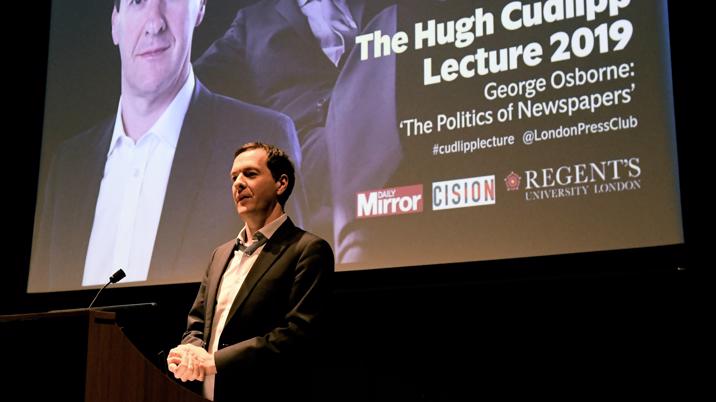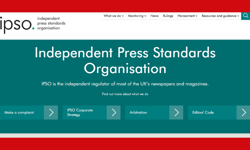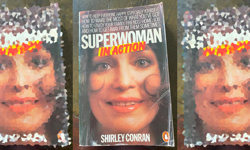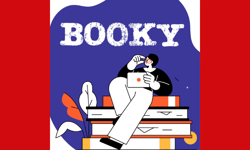
George Osborne began his lecture, which was titled ‘The Politics of Newspapers’, by thanking the Mirror for giving him a platform, wryly noting that it was the first time it had done so. He teased the assembled great and good of Fleet Street with some good warm up lines; about how on leaving university, he’d failed to become a journalist so became chancellor instead and how when he’d had enough of the spin and fiddled expenses of politics, he decided to try journalism.
He said he knew of no precedent for someone who’d lived in Downing Street taking an editor’s chair, although, of course, many journalists had become MPs.
He said that he would start by looking at two key questions (‘Do newspapers matter?’ and ‘Are they going to survive?’), move on to look at some of the things that might impact the future of journalism, and then end with his big idea.
That ensured no-one drifted off to the bar early, though to be fair to Osborne, he was an engaging and, at times, self-deprecating, speaker and it was a cogent and entertaining presentation.
In Britain, the terms of our daily conversation are more often than not determined by Fleet Street.
Do newspapers matter?
As a politician, certainly in his opposition days, they clearly mattered to him a lot. He had gone out of his way to woo the press, looking for “more favourable coverage”. In 2005, most of Fleet Street supported Tony Blair’s Labour, so he and David Cameron set about changing that through wining and dining editors and proprietors. He made no apologies for that – they had something Osborne needed – direct access to the public, and in a democracy of 65 million people, that connection was valuable.
He said that although newspapers don’t, in themselves, determine the outcome of elections or referendums, they do matter because they play a key role in shaping the debate.
Even today, when circulation figures are lower and far more people will watch a BBC or ITV news bulletin than pick up a newspaper, that influence is still there: “In Britain, the terms of our daily conversation are more often than not determined by Fleet Street.” In part, this is because of newspapers’ influential readerships and in part, because “our national broadcaster is more comfortable reporting stories broken by the national press than in initiating its own.”
In any revolution, it seems that only the new has value, but as excesses come, the novelty starts to wear off and people start to remember some of the things they’ve discarded.
Are they going to survive?
Newspapers have a big influence on the direction of the nation, and Osborne predicts that will continue to be the case for many long years to come.
That is not to say there are not huge challenges. As his audience that night would have been all too aware: print advertising is down by two thirds, circulations have halved and the number of full-time journalists continues to fall.
The internet had proved a huge disruptor to both politics and publishing.
He felt that he had become something of an expert in the politics of the 90s, with its 24/7 news cycle and emphasis on soundbites and ruthless message control. By 2017, that approach looked positively prehistoric. Trump had captured the White House with his Twitter feed and a new breed of politicians, like the 29-year-old Alexandria Ocasio-Cortez, were building huge profiles by being in constant conversation with the public and media through their social media posts. Large political demonstrations could now be organised and coordinated within hours using just the smartphone in your pocket.
The publishing world had been similarly disrupted – just compare how his own paper, the Evening Standard, made its money twenty years ago (mainly through classified advertising and newspaper sales) and how it does today.
The media had made the fateful decision to offer its content for free in the hope that advertising would pay for it, yet the current the travails of BuzzFeed and HuffPost show that it wasn’t just the legacy media that made that mistake.
On the plus side, Osborne sees a new commercial realism emerging. The FT and Times are having success with subscriptions (Osborne subscribes to them both) although the challenge is not so much getting middle class readerships to pay for up-market titles but how to finance mass market titles, which people will never pay for online.
The Evening Standard had, he said, got ahead of the curve by deciding to give it away (“a brilliant idea”) and publishers need to accelerate their development of additional revenue streams online, through events and via sponsorship. “If you want quality journalism, someone has got to pay for it. Newspapers are businesses not charities.”
He also detected a “glimmer of hope” in ‘fake news’. What encouraged him was the fact that people appeared to genuinely care that Russian bots were meddling in elections. Politicians cared enough to haul Facebook et al in front of Congress and the House of Commons. Big advertisers care, because they don’t want to see their products advertised next to foreign subversion and deliberate misinformation. Society as a hole must collectively keep up the pressure on the boards and shareholders of the big tech companies.
For Osborne, the antidote to ‘fake news’ is obvious: reputable news organisations that employ proper journalists and sub-editors – in other words, a newspaper or a broadcaster.
He also sees the first signs of an encouraging new trend: “In any revolution, it seems that only the new has value, but as excesses come, the novelty starts to wear off and people start to remember some of the things they’ve discarded and that is what’s happening here.”
“The Washington Post and New York Times are enjoying a healthy renaissance and, here in the UK, I believe that people will turn more and more to news brands. If they do, then there’s money to be made.”
Could public money ever have been used to buy stolen property, like the computer disks containing MPs’ expenses – one of the biggest newspaper scoops of my lifetime?
EU and Cairncross
Osborne also spoke of two other factors with the potential to impact our future. One he was optimistic about, in the sense that it would help create a more level playing field, the other he was less sure of.
The next EU Competition Commissioner would, he said, “have big American tech firmly in their sights.” Their monopolistic behaviour and the growing realisation that these are media companies in all but name and should be regulated as such, means that “regulation is coming in a big way to big tech” and “GDPR is just the start”.
As for the eagerly awaited Cairncross Review, Osborne clearly saw it as a bit of a damp squib. There were some useful recommendations about getting the competition authorities involved, but generally, “the report only scratches the surface”. A few more BBC-funded journalists might help here and there, but it wasn’t going to move the dial; abolishing VAT might help a few high-end subs products but “establishing an institute to funnel public funds into what they call public interest news feels like a Pandora’s box that no one will want to open. Once the state gets involved, trouble is coming.”
He posed the question: “Could public money ever have been used to buy stolen property, like the computer disks containing MPs’ expenses – one of the biggest newspaper scoops of my lifetime?”
The Tory in him continued: “accepting public money also smells of defeat because using tax payers’ money to subsidise what until now has been a commercial activity has never, in any industry, been a route to long term sustainability.”
It was time to think big, he said. He did not want to stifle competition, which is the driving force of positive change and nor did he want news providers to become charities. Instead, he wanted to create fair competition and break up monopolies.
The data is generated by you and you are handing it over for free.
Osborne’s big idea
George Osborne’s big idea was simple, in theory, if possibly not in practice: “Let people own their data – give power to the consumer not the producer.”
In the current digital world, our data belongs to the big commercial platforms. It’s incredibly valuable and companies like Google and Facebook have grown rich on the back of it.
“The data is generated by you and you are handing it over for free.”
People should have the right to take their accumulated data and share it with a producer of their choice.
Some more radical thinkers want to take this even further. Why not make social media companies pay consumers for using their data? The concept of a ‘data dividend’ is, said Osborne, an idea that has been knocking around the margins of Silicon Valley for a while, and is now beginning to enter mainstream discussion.
In this new data paradigm, media companies would all compete for consumers’ custom and the data would follow the consumer.
“This is not a magic bullet to solve all the problems of journalism,” he cautioned, “but it would create a fairer, more level playing field and could dramatically change the economics of the online world.”
Wrapping up, George Osborne said: “There’s something very precious about a free press. I’m optimistic about newspapers’ future, because people will always want to know what’s going on.”
Now that is a sentiment that even the harshest critics of the former Conservative chancellor, at the Mirror and elsewhere, would surely endorse.












